By conducting in-depth Competitor Keyword Research, you can develop a strategy that not only matches but surpasses their efforts. In the present competitive digital landscape, understanding and leveraging competitor keywords is an essential part of the SEO game to stay ahead of the curve. This comprehensive guide will walk you through advanced strategies and tools for mastering Competitor Keyword Analysis.
What is Competitors Keyword Analysis/ Research
Competitor Keyword Research is a strategy used in digital marketing and SEO to identify the keywords and phrases that competitors in your industry are targeting. This research helps you understand which keywords are driving traffic to your competitors’ websites and can provide insights into their content strategy, audience interests, and overall market trends.

Why Competitor Keyword Research Matters
Competitor Keyword Research is an important aspect of any strong SEO strategy. By analyzing the keywords that your competitors are successfully ranking for, you can:
- Identify Market Gaps: Find new keywords that your competitors are not targeting effectively, allowing you to capture untapped traffic by filling those gaps.
- Refine Your Strategy: Adjust your SEO strategy by focusing on high-performing keywords that are driving traffic to your competitors.
- Enhance Content Marketing: Create content that is more relevant and valuable to your target audience by understanding what works for your competitors.
Steps to Conduct Competitor Keywords Research
1. Identify Your Competitors
Begin by identifying your direct and indirect competitors. Direct competitors are those who offer similar products or services, while indirect competitors may target the same audience but offer different products or services.
2. Gather Competitor Keywords
Use SEO tools such as SE Ranking, Ahrefs, and SEMrush to extract a list of keywords your competitors are ranking for. These tools provide comprehensive data on organic search positions, traffic estimates, and keyword difficulty.
3. Analyze Keyword Performance
Evaluate the performance of each keyword by considering factors such as:
- Search Volume: The number of searches a keyword receives monthly.
- Keyword Difficulty: How challenging it is to rank for a particular keyword.
- Traffic Potential: The estimated amount of traffic a keyword can generate.
4. Identify Keyword Opportunities
Look for keywords with high search volume but low competition. These represent opportunities where you can potentially outrank your competitors with well-optimized content.
5. Prioritize Keywords
Prioritize the keywords based on their relevance to your business, search volume, and competition level. Focus on long-tail keywords that may have lower search volumes but are easier to rank for and more targeted to your audience.
Advanced Tools for Competitor Keyword Research
1. SE Ranking
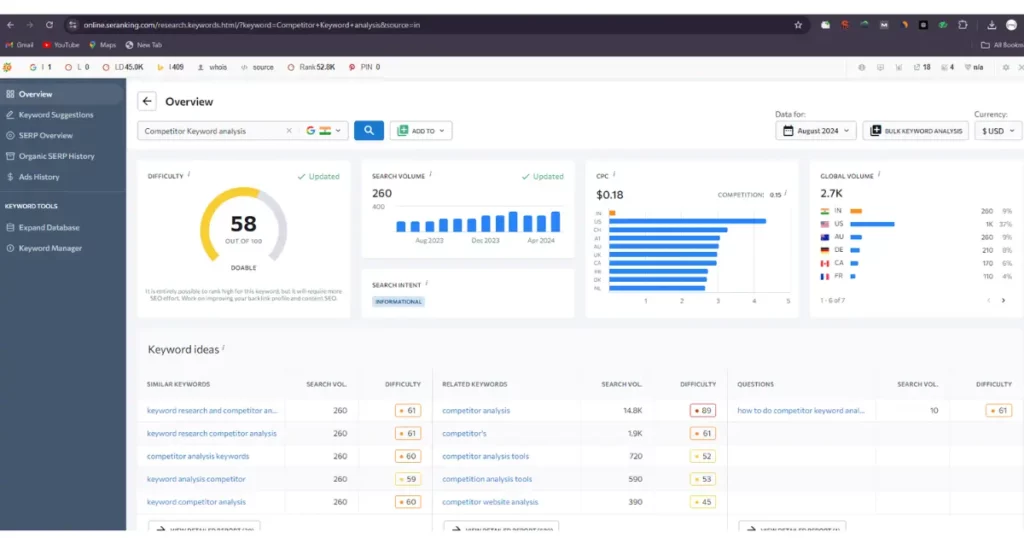
SE Ranking is a powerful tool that offers a detailed analysis of competitor keywords. It provides insights into:
- Organic Search Traffic: Understand which keywords are driving the most traffic to your competitors.
- Keyword Gaps: Identify keywords your competitors rank for that you do not.
- SERP Analysis: Analyze the search engine results pages (SERPs) to understand why your competitors are ranking and what you can do to improve your rankings.
2. Ahrefs
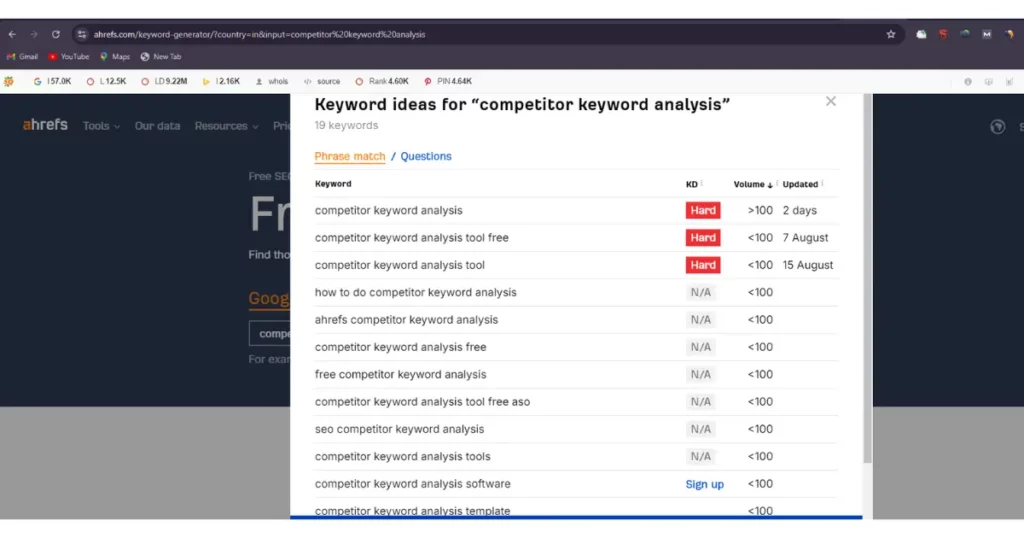
Ahrefs is another essential Competitor keyword research tool. With Ahrefs, you can:
- Explore Top Pages: Discover which pages are driving the most traffic to your competitors.
- Keyword Explorer: Use Ahrefs’ keyword explorer to find relevant keywords and see how difficult they are to rank for.
- Content Gap: Identify content gaps by comparing your site with your competitors and find topics they cover that you don’t.
3. SEMrush
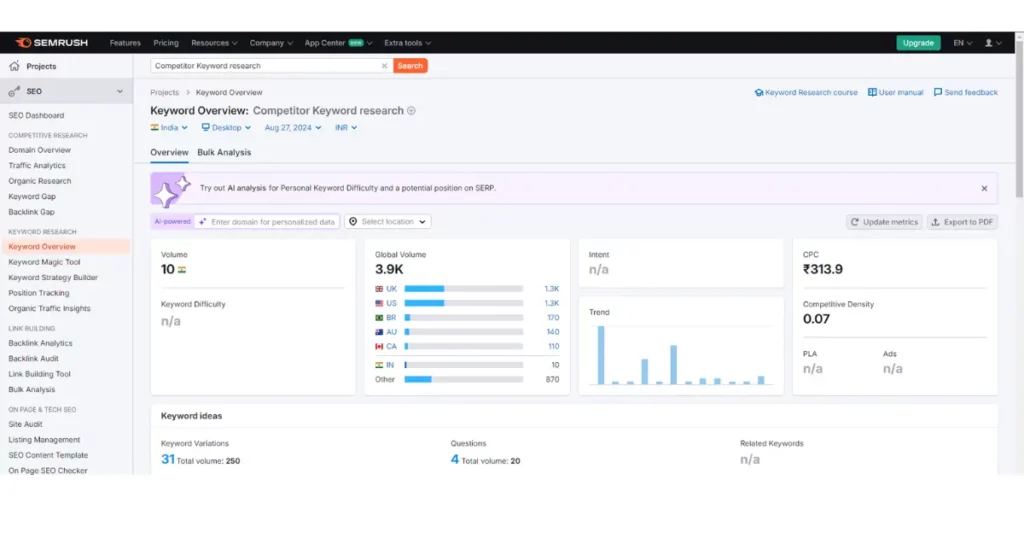
SEMrush offers a comprehensive suite of tools for competitor keyword analysis. It allows you to:
- Analyze Competitor’s Traffic Sources: Understand where your competitor’s traffic is coming from and which keywords are most effective.
- Keyword Magic Tool: Generate a list of keyword ideas based on your competitor’s keywords.
- Position Tracking: Monitor your rankings and compare them with your competitors over time.
Free Keyword Research Tools for Competitor Analysis
For those just starting or operating on a tight budget, there are free tools available that can help with competitor keyword research. While they may not offer the same depth of data as premium tools, they can still provide valuable insights.
1. Google Keyword Planner: Free Tool for Keyword Research
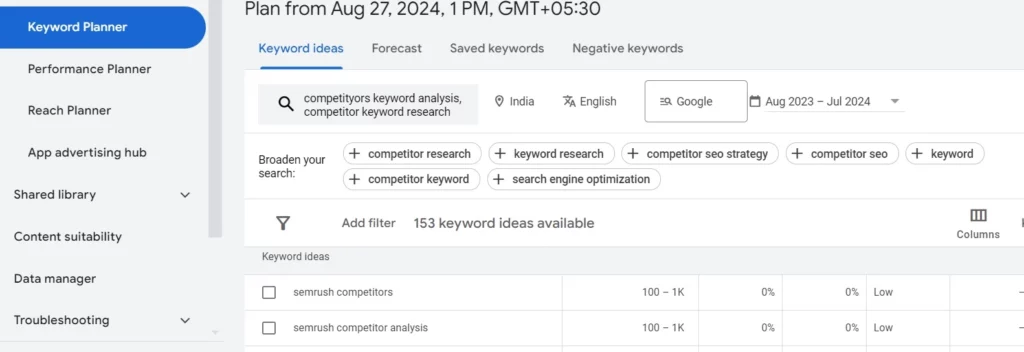
Google Keyword Planner is a free tool that helps you discover new keywords and see how they might perform. Although primarily designed for Google Ads, it can be a useful resource for identifying competitor keywords:
- Keyword Ideas: Enter a competitor’s URL to get keyword ideas related to their content.
- Search Volume and Trends: Access data on search volumes and historical trends to understand the potential of specific keywords.
- Bid Estimates: Get bid estimates to gauge the competition level for particular keywords.
Pros: Free to use, directly integrated with Google Ads, and offers reliable data.
Cons: Limited to Google’s ad data and requires an active Google Ads account.
2. Ubersuggest: Limited Searches for Free Version
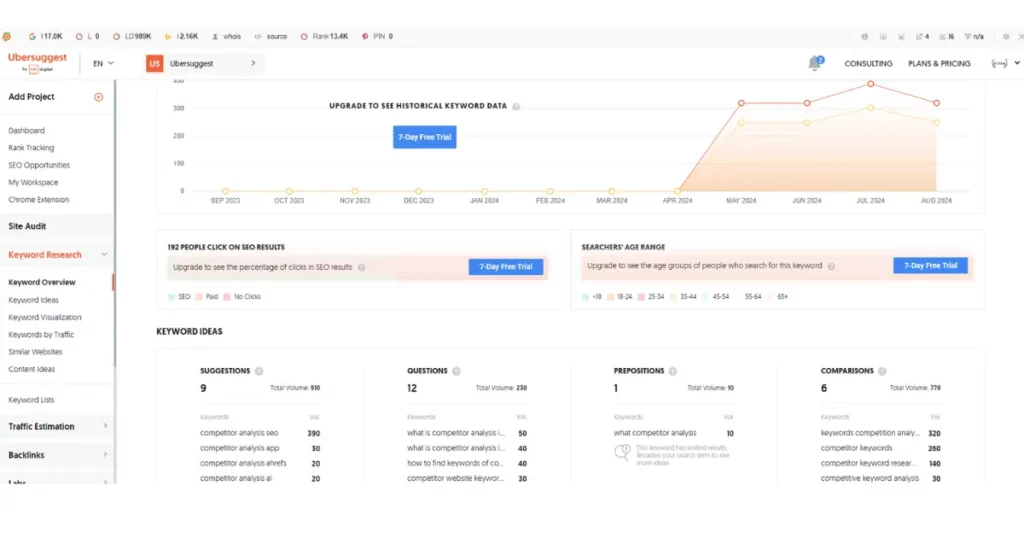
Ubersuggest, developed by Neil Patel, is a free Competitor Keyword research tool that offers a range of SEO insights. It provides keyword suggestions, search volume data, and competitive analysis features:
- Keyword Suggestions: Enter a competitor’s domain to find keywords they are ranking for.
- SEO Difficulty: Assess how hard it is to rank for specific keywords.
- Content Ideas: Get ideas for content that can help you outrank your competitors.
Pros: Easy to use and provides basic insights into competitor keywords.
Cons: Limited daily searches and restricted data access in the free version.
3. Moz Keyword Explorer (Free Version)
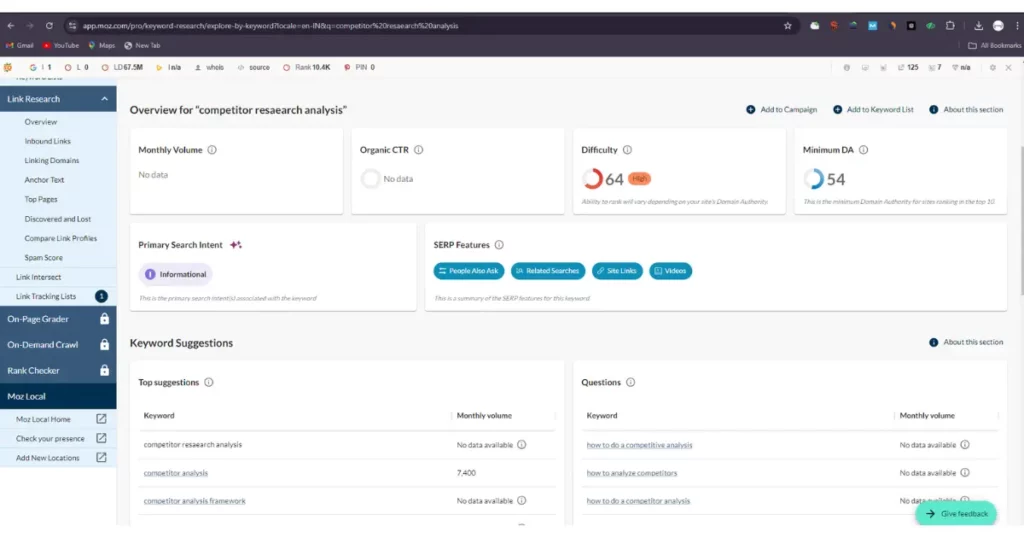
Moz offers a free version of its Keyword Explorer tool that can be useful for basic competitor keyword research. It provides:
- Keyword Suggestions: Discover related keywords by entering a competitor’s domain or keyword.
- SERP Analysis: View the top-ranking pages for a specific keyword and analyze your competitors.
- Keyword Difficulty: Understand how competitive a keyword is before targeting it.
Pros: Provides useful metrics for free, such as keyword difficulty and potential.
Cons: Limited to 10 free searches per month.
4. SpyFu (Free Version)
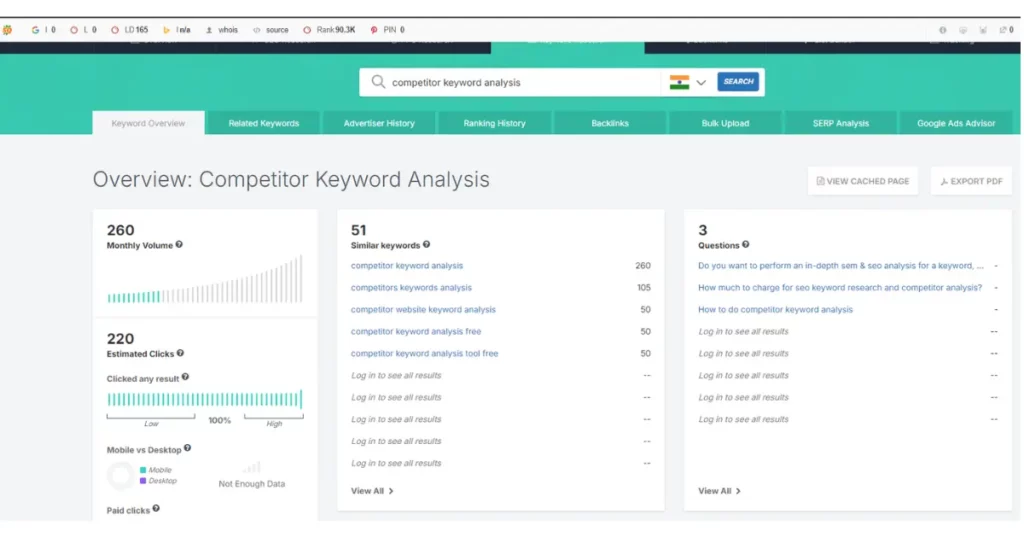
SpyFu offers a free version that provides limited access to its competitor keyword research tool features. It allows you to:
- View Competitor Keywords: See which keywords your competitors are ranking for.
- Competitor Ad History: Analyze your competitors’ ad campaigns and keyword targeting strategies.
- Top Pages: Identify the most successful pages on a competitor’s site and the keywords driving traffic to them.
Pros: Useful for quick checks on competitor keywords and basic insights.
Cons: Limited data and functionality in the free version.
5. Competitors.app : Free Tool for Keyword Research
Competitors App is a free Competitor keyword finder tool designed to help businesses discover the keywords they need to succeed in search engine optimization (SEO). By using this tool, you can enter a website URL (such as your own or a competitor’s) to get a list of relevant keyword suggestions.
Pros: Free to use Provides keyword suggestions at no cost.
Cons: It may lack advanced features like detailed traffic analysis
6. SEOStack Keyword Tool
SEOStack is a free Chrome extension that generates keyword suggestions from various sources like Google, Bing, Yahoo, YouTube, and Amazon.
Pros: Completely free and easy to use, great for generating a broad list of keyword ideas.
Cons: Lacks in-depth competitor analysis and other advanced SEO metrics.
Implementing Your Findings
1. Optimize Existing Content
Use the competitor keywords you’ve identified to optimize your existing content. This may involve updating your titles, meta descriptions, headers, and body content to match the target keywords better.
2. Create New Content
Develop new content that targets the high-priority keywords identified in your analysis. Ensure that your content is comprehensive, engaging, and offers more value than your competitors’ content.
3. Monitor and Adjust
SEO is an ongoing process. Regularly monitor your rankings for the targeted keywords and make adjustments as needed. Use tools like SE Ranking, Ahrefs, and SEMrush to track your progress and refine your strategy.
Competitor Keyword Resarch is essential for optimizing your SEO strategy. By analyzing your competitors’ keywords and performance, you can gain valuable insights to improve your search rankings. By understanding which keywords your competitors are targeting and analyzing their performance, you can make informed decisions that will help you outrank them in search engine results. Use advanced tools and effective strategies to drive more targeted traffic to your website.
For a comprehensive understanding of Competitor Keyword Analysis and other SEO techniques or any other aspects of Digital Marketing consider enrolling in IFTDM’s Advanced Digital Marketing Course the course provides detailed knowledge of various aspects of Digital Marketing combined with 14+ certifications widely accepted and useable to climb the corporate ladder or in your business.
Be part of the next
group of participants
sign up today!

Unlock the keys to your passion and success with us, as we specialize in cultivating innovative and creative minds, shaping a path to endless possibilities.
Quick Links
Contact us
3rd floor, B-70, sector 67 Noida 201301
Prefunction Room, Central Library, Jamia Hamdard University, Hamdard Nagar, New Delhi
+91 8960221222
info@iftdm.com





